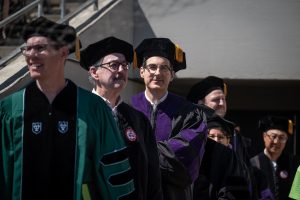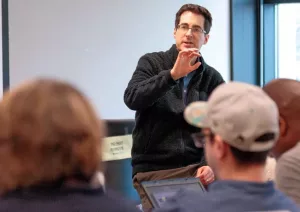
Professor Jim Hilbert (looking at camera) awaits the beginning of commencement at CHS Field on June 6, 2021. Hilbert is now interim president and dean.
“This is a special place. What we’re doing is different than other law schools.”
Jim Hilbert is pretty sure his first time on the Mitchell Hamline campus was to use the library.
That was 25 or more years ago, when he was in private practice. Students at what was then William Mitchell College of Law were starting to access more materials online, but Hilbert still liked looking through actual books and found the Warren Burger Library a quiet place to work.
In the years since those study sessions, he’s gradually increased his relationship with William Mitchell and Mitchell Hamline. After being a guest speaker and then adjunct professor, Hilbert became a full-time faculty member in 2015 and was awarded tenure in 2019. In December 2020, he became vice dean six months after Anthony Niedwiecki began as president and dean. Last week, Hilbert became interim president and dean, scheduled to lead the school until a new president and dean takes over in July 2024.
It was never the planned course, but Hilbert says he’s grateful to be leading the school, even on a temporary basis, at a time when transformation abounds.
“Years of law school and a law degree don’t just transform an individual student’s life,” he said. “That combination of expertise with the important credential of a J.D. can often greatly impact the student’s community, as well. We provide opportunities to students in geographically isolated or socially marginalized communities that don’t always have sufficient access to legal representation.
“We are able to make that happen because we have been transforming legal education all along—whether it is a focus on practical skills, the use of technology, or providing the right mix of support so our students can thrive. I’m ready to do my part to make sure those things continue.”
Hilbert was born and raised in St. Paul. His mother, Dawn, was a jazz pianist. His father, Otis, left ironworking to become an attorney. The older of two brothers, Hilbert earned a sociology and anthropology degree from Carleton College with designs on a career as a performer.
He tried acting and appeared in a few independent films he hopes are lost to history. But he was also a musician, like his mother. He sang and played several instruments. “I also wrote a lot of songs that nobody seemed to like,” quipped Hilbert. “I’m not sure I liked them that much, if I’m honest.”
In the years after college, as a music career wasn’t quite panning out, Hilbert focused his energy on service and advocacy. He spent three years working directly with adults with severe and intellectual and developmental disabilities while also serving as a political organizer for several progressive candidates on the local and national stage. It was because of these two activities that Hilbert decided to go to law school. “It became clear that to make the kinds of changes I wanted, I needed to access the system at a different level. I learned a lot of work in those settings, and I deeply respect the people who continue that work.
“For me, it helped me realize my goal was to be a civil rights attorney.”
Which is what he did, after earning a law degree at the University of Minnesota Law School, where his father had attended.
As a law student, one of Hilbert’s first assignments as a law clerk for the Minneapolis NAACP was to research and draft a certiorari petition, which had the unique distinction of eventually being granted by the U.S. Supreme Court. It was part of the NAACP’s a yearslong desegregation case in the 1990s.
After serving a year as the first legal fellow at the Institute on Race and Poverty, Hilbert joined the Shulman Law Firm, a former boutique antitrust and civil rights firm, where he continued his work on the desegregation case in addition to other plaintiffs’ civil rights cases. “Jim developed his extensive and outstanding skills in large part working on the desegregation case,” said Dan Shulman, founder of the law firm. “I’m proud to have helped start him on his remarkable career path.”
Since that time, Hilbert has remained involved in the NAACP as an executive committee member of the St. Paul NAACP and ad hoc counsel to the state chapter. In 2021, the St. Paul NAACP awarded him a Community Service Award.

Poster for the film “Justice,” which Jim Hilbert co-produced.
Hilbert has always sought creative ways to promote civil rights. After a combination of successful settlements came in around the same time, his firm decided to take time off from practice to make a feature film about the criminal justice system. The four attorneys split the responsibilities; Hilbert was a co-producer (which earned him immortalization on imdb.com).
Filmed in the Twin Cities, “Justice” had a popular run at the Riverview Theater in Minneapolis and a distribution deal on STARZ. After some limited theatrical showings nationally, the movie was nominated for an NAACP Image Award, which gave Hilbert the memory of walking into that year’s ceremony on the red carpet behind Blair Underwood.
The movie did not enjoy commercial success, but the law firm had created an accompanying teaching guide on civil rights. The movie found a place in social justice curricula. “In retrospect, it was never going to make money,” said Hilbert. “It was still a lot of fun, and it got enough attention that it helped continue important conversations about systemic injustices here in the Twin Cities and nationally.”
Earlier in his legal career, Hilbert was also invited to speak to a few classes at William Mitchell on his civil rights work. He was soon approached about teaching as an adjunct. “I realized speaking to those classes that I loved teaching, particularly about skills and techniques I had learned in practice,” said Hilbert.
As vice dean under Niedwiecki, Hilbert was on the executive leadership team that shepherded the law school through COVID while continuing the mission of finding more ways to expand access to law school to more people.
“Jim is a perfect leader for this transition time,” said Niedwiecki, who announced in March he would be stepping down and will return as a faculty member in the 2024-25 school year. “Mitchell Hamline will be well-served by his enthusiasm for our law school and for legal education.”
Hilbert is also married to a Mitchell Hamline alum, Priti Patel ’92, who is currently vice president and chief transmission officer at Great River Energy. They have two children.

Prof. Jim Hilbert teaching in a classroom, in an undated photo
Hilbert has continued to teach even as a member of the administration. Last summer, he taught Expert Witness Advocacy and is teaching Transactions and Settlements this fall. His scholarship covers desegregation law and policy, police reform, expert witness testimony, and negotiation. He also co-directs the Expert Witness Training Academy, which is funded by the National Science Foundation and provides training to climate scientists on communicating in courtrooms and legislative hearings.
The search for a new president and dean is well underway. Hilbert does not plan to seek the permanent post and will eventually return to the faculty. But in the time he has at the helm, Hilbert plans to focus on making sure people remember that “this is a special place, and our students are remarkable.”
“What we’re doing is different than other law schools,” he said. “We’re trying to reach students whose incredible potential is often overlooked by other schools or provide opportunities to students who could not go to law school if not for us. We’re increasing access to law school. And we’re trying to break down traditional barriers that have long existed in legal education.
“I’m thrilled to be part of that work.”
